Tuesday, February 20, 2024. Annette’s News Roundup.
I think the Roundup makes people feel not so alone.
To read an article excerpted in this Roundup, click on its blue title. Each “blue” article is hyperlinked so you can read the whole article.
Please feel free to share.
Invite at least one other person to subscribe today! https://buttondown.email/AnnettesNewsRoundup
____________________________________________
Joe is always busy.
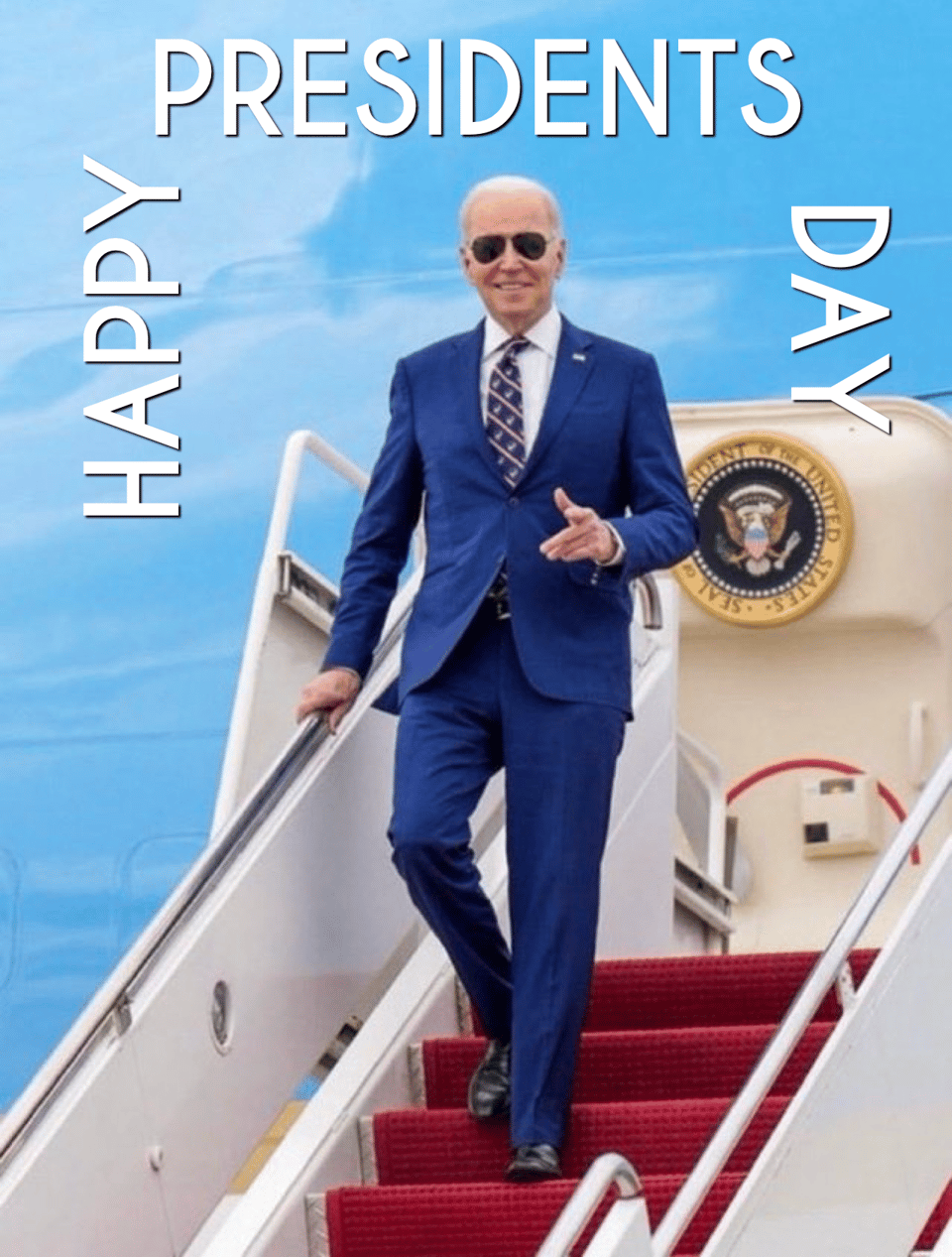
Happy Presidents’ Day, @POTUS! 💙 pic.twitter.com/bVhprEg9Kq
— best of kamala harris (@archivekamala) February 19, 2024
Poll Ranks Biden as 14th-Best President, With Trump Last.
President Biden may owe his place in the top third to his predecessor: Mr. Biden’s signature accomplishment, according to the historians, was evicting Donald J. Trump from the Oval Office.
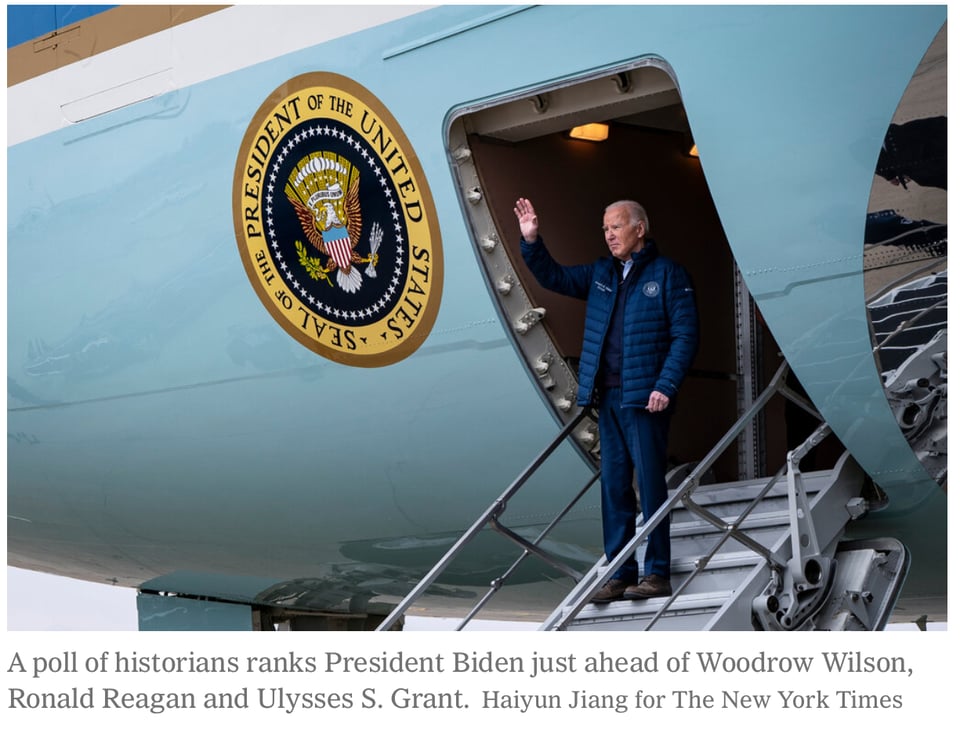
A new poll of historians coming out on Presidents’ Day weekend ranks Mr. Biden as the 14th-best president in American history, just ahead of Woodrow Wilson, Ronald Reagan and Ulysses S. Grant. While that may not get Mr. Biden a spot on Mount Rushmore, it certainly puts him well ahead of Mr. Trump, who places dead last as the worst president ever.
Indeed, Mr. Biden may owe his place in the top third in part to Mr. Trump. Although he has claims to a historical legacy by managing the end of the Covid pandemic; rebuilding the nation’s roads, bridges and other infrastructure; and leading an international coalition against Russian aggression, Mr. Biden’s signature accomplishment, according to the historians, was evicting Mr. Trump from the Oval Office.
“Biden’s most important achievements may be that he rescued the presidency from Trump, resumed a more traditional style of presidential leadership and is gearing up to keep the office out of his predecessor’s hands this fall,” wrote Justin Vaughn and Brandon Rottinghaus, the college professors who conducted the survey and announced the results in The Los Angeles Times.
(Full article is in the New York Times).
____________________________________________
Navalny and Navalnaya.
“These Bastards Will Never See Our Tears”: How Yulia Navalnaya Became Russia’s Real First Lady.
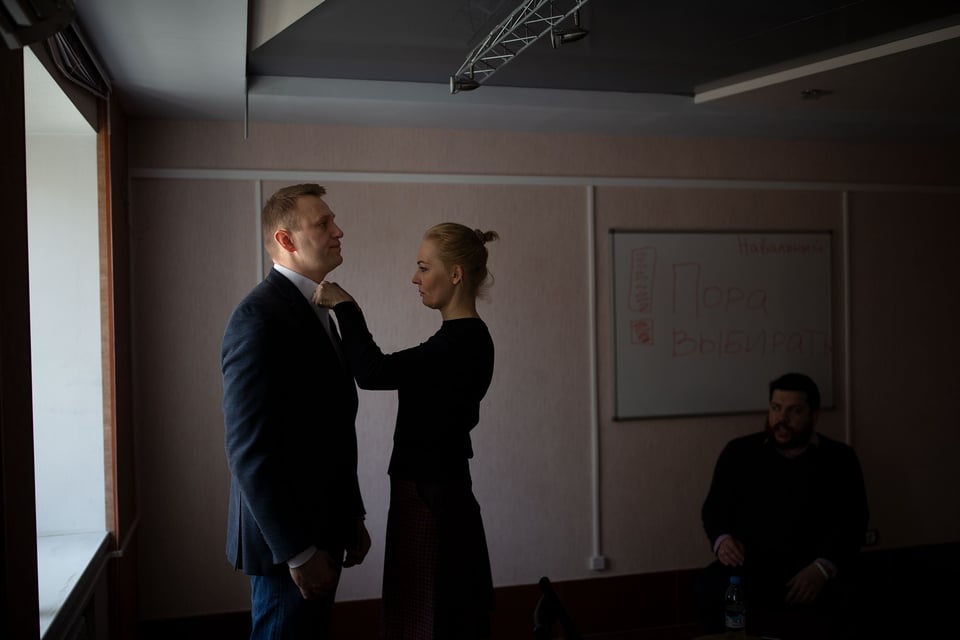
Yulia Navalnaya is the force behind Alexey Navalny.
It was 6:40 on the morning of August 20, 2020 when Yulia Navalnaya’s phone rang. She wasn’t normally up that early, but she was preparing to go to the airport to meet her husband, Alexey Navalny, the sole remaining leader of the Russian opposition, whose flight from the Siberian city of Tomsk was scheduled to arrive in Moscow at eight that morning. Navalnaya looked at her phone. It was Kira Yarmysh, her husband’s press secretary, who was supposed to be midflight with Alexey. “Yulia, don’t worry,” Yarmysh said. “Alexey has been poisoned, the plane landed in Omsk.” Navalnaya said “okay” and hung up. If the plane carrying her husband had to make an emergency landing 1,700 miles from its intended destination, Alexey’s life must have been in imminent danger. This was it, then. She had been preparing for this moment for a decade, and now it was finally here, pouring in with the sun on this warm summer morning. Her children were still asleep. A thought flitted by. “The most important thing is not to relax,” she felt, “to not show weakness.” It would stay with her for weeks.
She called Yarmysh back and told her she was coming to Omsk. Yarmysh tried to dissuade her—maybe Navalny would get better in a day or two and return to Moscow on his own—but Navalnaya stood firm. Seeing that a flight was departing for Omsk in two hours, Navalnaya threw a random medley of clothes into a suitcase and bought her ticket in the back of a cab. (“Why didn’t the people you’re going to see give you any advance notice?” the cab driver asked when Navalnaya told him she absolutely had to make the flight.) As she waited in the airport, a message from Yarmysh arrived: Navalny was in a coma and on a ventilator. Navalnaya got up, found a café, and, despite the early hour, ordered a whiskey. That was when the tears began to fall, a silent cascade. “I was unable to restrain my emotions,” she would later tell Russian journalist Yury Dud, as if justifying an embarrassing lapse.
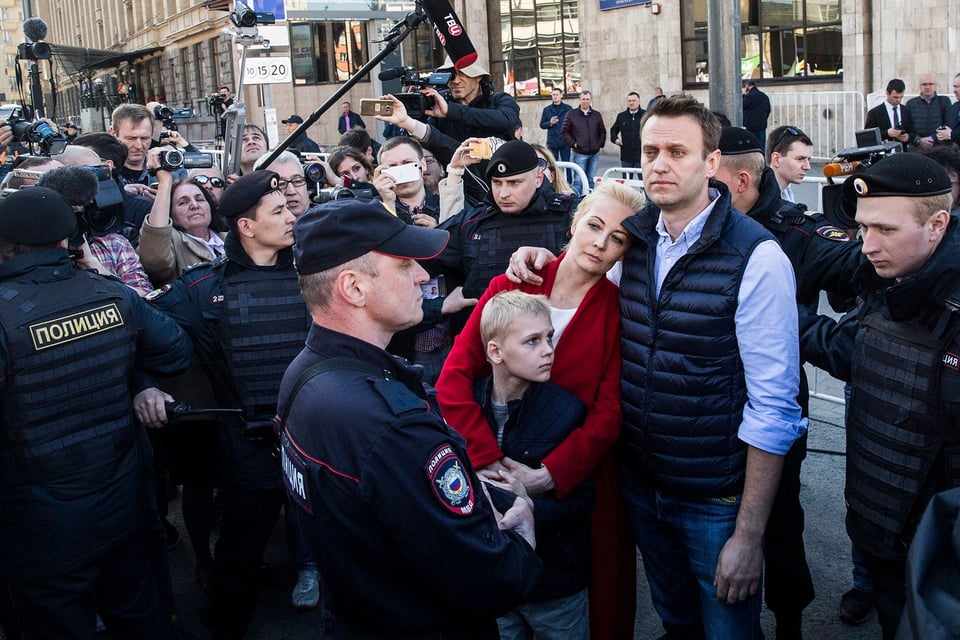
The Navalnys at a 2017 demonstration.
She hid behind a pair of sunglasses and resumed the wait, the most agonizing, she imagined, of her life. By the time she boarded the plane, Ivan Zhdanov, director of Navalny’s Anti-Corruption Foundation, or FBK, was with her. Navalnaya realized she would have to turn off her phone and cut herself off from any information about her husband for the three-and-a-half-hour flight. Friends describe Navalnaya as deeply reserved. “Yulia is a very closed person,” says the journalist Yevgenia Albats, who is close with the Navalnys. “She doesn’t like to talk about herself.” And yet, Navalnaya talked at Zhdanov for the entire flight, without pause. “I think I told him all our family secrets,” she would recall. “I was scared to be alone with myself and to think.”
As the plane prepared to land, she realized that no, this must be the worst moment of all. What news awaited her when she switched on her phone? Navalnaya quickly found a solution: She would have Zhdanov read the text messages that had come in, and she would be able to tell by his expression how bad things were. “I wanted to collect myself and be okay when I walked out into the airport,” she explained.
Her husband, she learned, hadn’t died, but the hardest was yet to come. At the hospital in Omsk, Navalnaya would encounter a wall of doctors who seemed more scared of their civilian superiors than they were of losing their patient. They were reinforced—or kept in line—by a small battalion of plainclothes federal security officers, all intent on keeping her from seeing her husband. To enter his room, she would need to present a marriage certificate, they said, and secure verbal consent from Navalny, who was still unconscious and on life support. She would stare them down, out-argue them, and bend their will to hers, all while a gathering swarm of journalists trained their cameras and microphones and smartphones on her. She would finally break through to see him, his body sprouting tubes and cords like vines, writhing in near-constant seizures. (She wouldn’t know until days later that this was the result of a military-grade nerve agent in the Novichok family.) She would have to fight with doctors and hospital administrators to see the results of her husband’s lab work, to give impromptu press conferences on the hospital steps, to sneak around the city to find the German doctors who had arrived with a private medevac plane and whom the authorities had barred her from seeing. She would have to demand, over and over, that the Omsk hospital release her husband and allow him to be loaded onto the plane and taken to Berlin, the only way, everyone knew, of possibly saving his life. And she would never, ever lose control of her emotions again.
For two days, Russia and the world waited nervously to see if Navalny, the only halfway plausible alternative to Vladimir Putin, lived or died. Instead, they saw Navalnaya. This pretty blond woman in a black leather jacket who had always appeared silently at her husband’s side was suddenly alone on the world stage, doing battle with the entire repressive machinery of the Russian state to pull her husband from the jaws of death. What people saw astounded them. “Russia is still a sexist country,” says economist Sergei Guriev, a friend and onetime adviser to Navalny. “People think that a woman is not an independent person, especially if she doesn’t work. Therefore, they didn’t understand that Yulia is an independent person. And then they understood. They saw Yulia fight the machine and win. I think for many people it was eye-opening.”
That is an understatement; Navalnaya was a revelation. The country saw her living out the worst moment of her life—live. And yet she was strong, she was stoic, she didn’t crumble under pressure and, through the sheer force of her will and the strength of her love, she got the dragon to release her man. In a culture that intuitively understands redemption through suffering, in a society that believes women are by nature maternal nurturers, Navalnaya was immediately understandable. “It is a story of biblical proportions,” says Guriev. Journalist Anna Mongayt added, “Russia has never had a queen like Yulia.” But it was more than a fairy tale. Through Navalnaya, all of her husband’s sins—his prickliness and perceived authoritarianism, his propensity to pick fights with the liberal Moscow intelligentsia and independent journalists, his past flirtations with nationalism—were suddenly expiated. “People who like Navalny automatically like her,” says journalist Serguei Parkhomenko, a friend of the couple. “And there are some people for whom she is Navalny without the downsides of Navalny: her self-sacrifice, her single-mindedness, her opposition to Putin.”
“If I were scared, it would be difficult to live with him.”
As midnight closed in on Omsk, Alexey Venediktov, editor in chief of the liberal Ekho Moskvy radio station, went on the air in Moscow. He telegraphed to Navalnaya what needed to be done. “Until Yulia makes a public declaration, until she makes a request to the Russian government to transport Alexey Navalny out of the country,” Venediktov said, no transfer would be possible. “We’re waiting.” People close to the Navalnys understood this to be a message from the Kremlin, passed through Venediktov, who is very public about maintaining a cozy relationship with the presidential administration, ostensibly to keep his station from being shuttered. Venediktov told me that he did in fact lobby on Navalnaya’s behalf with his friends in the Kremlin, but that they did not insist on a public appeal from her. That was his idea. “I said this myself, that this might help and would have an effect on VVP, because that kind of thing works on him,” Venediktov explained, using Putin’s initials. Regardless, it put Navalnaya in an impossible situation. “You know you have to bend your knee to Putin and ask for your husband to be let out, but you know that Alexey would rather die than ask Putin for anything,” explains Albats, who was in touch with Navalnaya while she was in Omsk. “And that’s the only thing you can’t do. Because this is a betrayal of Alexey.”
The next day, with the plane from Germany already on the ground in Omsk, Navalnaya issued a public letter to Putin. “I am officially addressing you,” she wrote, “with a demand for permission to transport Alexey Anatolievich Navalny to the Federal Republic of Germany.” Within hours, she was boarding the plane alongside her husband, invisible on a gurney that was part cocoon, part coffin. Her formulation—a demand rather than a plea—was not lost on the Russian opposition. Even at her most desperate and vulnerable, she approached Putin, the man trying to kill her husband, not as a fearful supplicant but as a defiant equal.
In the following months, as Navalnaya and her husband documented his resurrection and recovery on social media, they became the measure of decency and nobility for millions of Russians. There were Yulia TikTok memes and Yulia Instagram flash mobs. People began to wonder whether they would be capable of such heroism under such duress—and, of course, everyone wanted a love like theirs. “[They are] so relationship goals,” one friend in Moscow told me.
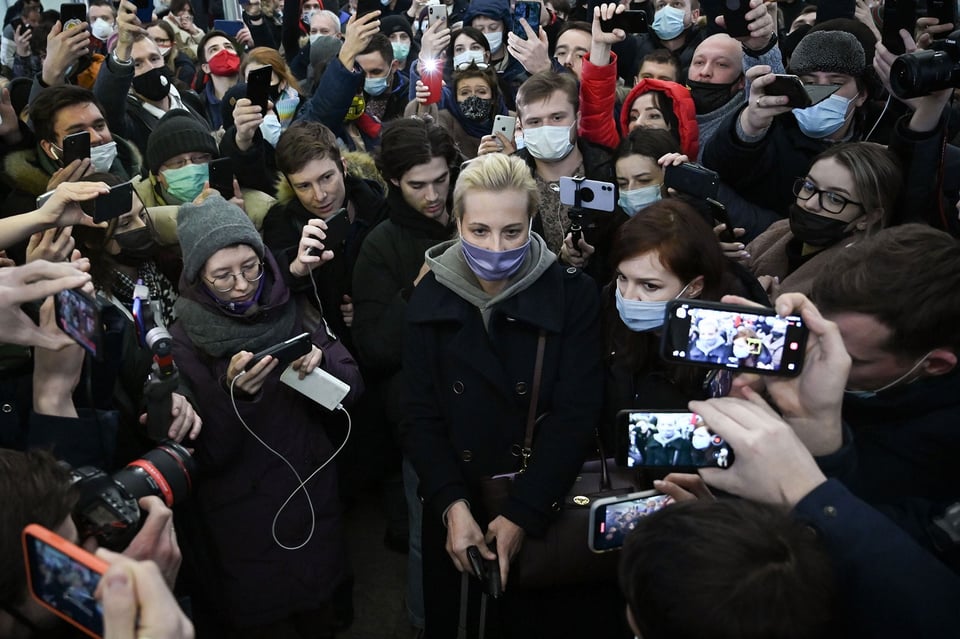
Navalnaya in Moscow after her husband was arrested upon arrival from Berlin.
Because of who her husband is, all of this quickly became political. In a country that hasn’t had a first lady since Putin’s divorce in 2013, here was a political wife who could more than hold her own in an almost exclusively male arena. “We’ve lived for seven years without a first lady, and it seemed like no big deal,” journalist Maria Komandnaya said on her podcast. “We’ve forgotten that this institution exists, but when we saw Yulia Navalnaya in all her beauty, it was like a light went off for everyone: Here she is, the first lady.” Some compared Navalnaya to Michelle Obama. Others, inevitably, to Sviatlana Tsikhanouskaya, who, a week before Navalny was poisoned, spearheaded an unprecedented wave of protests in neighboring Belarus after her husband, an opposition activist, was jailed. Could Navalnaya, people wondered, be Russia’s Tsikhanouskaya? Could she be not just the next first lady of Russia but its next leader? Yabloko, the old liberal democratic party where her husband had gotten his start, announced it was willing to support Navalnaya if she were to run for Parliament. Even Tsikhanouskaya encouraged Navalnaya “to begin her political career.”
Navalnaya quickly shut down the speculation. “I think it’s much more interesting to be the wife of a politician,” she told Russian Harper’s Bazaarin January, one of only a handful of interviews she’s ever given. “Then again what I do is, to a certain extent, also politics.”
Yulia Abrosimova was born in Moscow on July 24, 1976. Her father was a government scientist, and her mother worked at Gosplan, the Soviet central economic planning agency. Her parents divorced when Yulia was in grade school, and her mother married a Gosplan colleague. They were an average Soviet family, living in a sea of high-rise apartment buildings in Moscow’s Olympic village. When I first met her in early 2011, Navalnaya told me her mother and stepfather talked about international economics at home, which drew her into majoring in the subject in college. “I knew all the government ministers by name,” she said. “I was interested in it.” She also told me the story of how, in the summer of 1998, at a resort in Turkey, she met a young lawyer named Alexey Navalny. “He immediately felt that I would be his wife,” she said. Two years later, it came to pass. People who know her say she never had any professional ambitions of her own, so when her first child, Dasha, was born in 2001, Navalnaya stopped working and became a stay-at-home mom. In 2008, a son, Zakhar, was born. They were very difficult pregnancies, and the couple scrapped their wish for more children.
Albats first met Navalny when someone brought him to the weekly seminars she ran for young opposition activists in 2005. It had been six years since Putin had ascended to power, and he had already managed to stifle dissent in the media and eliminate competitive elections. At the time, Navalny was a recovering real estate lawyer who was just getting a foothold in opposition politics, and he struck a slightly pathetic figure. He was tall, stoop-shouldered, awkward, with a bit of a beer belly—“a man-child,” a fellow activist remembers. He was from a simple family from a military town outside of Moscow—the boonies for any self-respecting Muscovite—and was far less educated and worldly than the intelligentsia in opposition circles. But when Albats saw him at his 30th-birthday party in the summer of 2006, he was different: He had Yulia in tow. She was tall and striking. She laughed and danced, but Albats got the distinct sense that she kept everyone at arm’s length. “She’s a queen,” Albats thought to herself. “And Alexey was dancing around her like a little rooster. And that’s when I thought, this is the motivator. In addition to his personal ambition, he needs to constantly prove to this beautiful woman that he is worthy of her.”
For years, Navalnaya was focused on raising their two children while her husband published investigations of fraud in the Russian government and state-owned companies. “He leaves early and comes home late,” Navalnaya told me back in January 2011. “At first it irritated me, but then I see what people write about him, about what a good job he’s doing, about who would do it if it weren’t for him.” It clearly made her proud, and she obviously shared his views. At the time, most people were deeply apathetic to politics. Consumerism and rising wages fueled by a commodities boom were all anyone seemed to care about after the poverty of the 1980s and ’90s. Opposition protests attracted a couple hundred people at most. The indifference frustrated Navalnaya. “People ask why he’s doing this,” she told me then. “Mostly they’re not interested, they just want to go shopping. I can’t judge them, but things would be a lot better if they cared.”
We were sitting in her tiny kitchen in the tiny apartment she and Navalny rented in Maryino, a remote, lower-middle-class Moscow neighborhood. As Navalny stepped up his investigations into corruption at the highest levels of the Russian government, the FSB moved in. They bought an apartment across the way so they could monitor the couple around the clock. (“Can you imagine it,” Albats says. “They’re making love under the eye of the FSB!”) Agents began tailing not just Navalny but Navalnaya and her children. It bothered her but she took it in stride, joking with friends that, since the FSB was following her daughter, they might as well save Navalnaya some time and just drive Dasha home from school.
Navalnaya rarely gives interviews—and she declined to do so for this story—but when she does, she is always asked a version of this question: Aren’t you tired of this life? Haven’t you asked Alexey to stop what he’s doing for the family’s sake? It is a sentiment rooted both in old Russian folk wisdom and in Bolshevik ideology that women are the most fearful and conservative elements of society, that they are not the engine but the brakes of revolution, tearfully holding their men back from the barricades. I asked Navalnaya a version of this question a decade ago. “I’ve never said it,” she told me. “If I were scared, it would be difficult to live with him.” When Navalny ran for mayor of Moscow in 2013, she gave her first television interview and was asked the same thing. “I think that many people expect me to say this to him at home,” she said, perfectly poised on the edge of a studio couch. “No, I’ve never in my life said anything like that to my husband, because I genuinely understand that he’s not doing it for himself. He’s doing it for my children and for everyone else, and he wants life [in Russia] to get better.” Why not stop for the sake of Dasha and Zakhar, the interviewer asked her. Obviously surprised, she exclaimed, “Because it’s them he’s fighting for!”
Navalnaya has insisted that her primary concern is the home front. “My main task is so that, in spite of everything, nothing in our family changes,” she said in her interview with Harper’s Bazaar, “so that the children can remain children, and the house a home.” But even finding a home has been a challenge. A few years ago, the Navalnys decided to move to an apartment closer to FBK’s offices. No one would rent to them. Still, Navalnaya worked hard to maintain a sense of normalcy for her children through their father’s arrests and the attacks on him, to make sure they did well in school and were well-adjusted. Navalnaya seems to have succeeded in this. Dasha, who told her kindergarten class that her father’s job was going to protests, started her own popular YouTube channel and is now in her junior year at Stanford. Zakhar, who grew up constantly hearing that his father was on the verge of being killed, kept on playing his video game when he was told about Navalny’s poisoning.
Navalnaya’s presentation as the private, homebound half of the couple, however, is deceiving. “Navalny the politician is two people: Yulia and Alexey,” says Albats. “She’s his editor in chief, she reads everything he writes before it’s published.” Navalnaya is also a crucial sounding board. “He consults with Yulia and talks through certain ideas with her to formulate them better,” says Lyubov Sobol, a lawyer who was one of Navalny’s first employees. Before Navalny hired a press secretary, it was Navalnaya who would take to his blog and social media accounts to update his supporters when he was in jail. She dresses Navalny and is very attuned to the image he cuts. She also keeps him humble. “It’s obvious that she criticizes him when there’s something to criticize him for,” says Guriev. “This forces Alexey to remember that he’s not the greatest person in the world, and that’s very important for him.” More importantly, says Vladimir Ashurkov, one of Navalny’s longest-serving lieutenants, “Yulia is the rock on which Alexey stands. She’s got his back.”
Navalnaya is also a careful and astute political observer. “She feels everything very keenly and observes everyone around her,” says Albats. “I honestly think that she likes being the shadow politician.” Navalny once joked that his wife is even more radical than he is, but she has been careful to never make her positions known on the one subject that has dogged him: nationalism. People close to her simply say that her views align with her husband’s, and that the latter has evolved away from the anti-migrant rhetoric that characterized his early forays into public politics.
The radicalism, people close to her say, manifests itself in a different way: She is a harsher judge of character and less forgiving of transgressions. When a Kremlin loyalist posted a doctored photo showing that Navalnaya had German citizenship (she does not) and then apologized, she refused to accept. “You are apologizing because you are a coward,” she wrote on Instagram, where she has more than a million followers, and called him “an overgrown mama’s boy.” When Oleg Kashin, a journalist who was once close to the Navalnys, alleged that Navalnaya’s father was actually an FSB agent living in London, Navalny refuted the theory: Her father had never worked for the security services. Moreover, he was not currently working for the FSB in London because he had died in 1996; here was his death certificate. Kashin, who admits that the incident was “an embarrassing failure,” told me, “I have apologized several times, but I don’t think these apologies are welcome.” Like many people I spoke to, Kashin believes Navalnaya is the source of Navalny’s conflicts with others in the Russian opposition. (Ashurkov confirmed this. “She’s likely to judge these kinds of people more harshly,” he said, adding that Venediktov also falls into this category.) A source who has known the Navalnys for a decade told me, “She’ll be quiet, quiet, and then she’ll annihilate you with one word.”
Navalnaya has always been extremely self-contained. “She is like the consummate British lady from classic novels,” says the source. “She is always extremely polite and friendly, but you’ll never find out anything about her if you’re not in her inner circle. You’ll walk away with a pleasant impression, but you’ll never get under her skin.” The years of unrelenting pressure from the Kremlin have simply transformed the introversion into steel. On top of a string of arrests and jail sentences, Navalny suffered a severe chemical burn to his right eye in 2017 when a thug, apparently hired by the government, splashed a bright green antiseptic in his face. Her friends’ and family’s apartments have been searched by authorities several times, so she avoids revealing the identities of her nonpolitical friends so they might avoid this fate. “The experience has hardened her,” says Ashurkov. “Of course, she’s changed over these years,” says a friend of Navalnaya who asked for anonymity to speak candidly about their relationship. “The world has split more clearly into black and white. I think she’s become tougher and more decisive.” Says the source who has known the Navalnys for 10 years, “Everything that’s happened to this family doesn’t predispose them to letting in strangers and trusting easily. It’s great to be friends with everyone when they’re not trying to take out your eye.”
“Navalny the politician is two people: Yulia and Alexey. She’s his editor in chief.”
In July 2013, while Navalny was running for mayor of Moscow, he was also facing politically motivated criminal charges in the city of Kirov. A train car full of journalists and activists (including Boris Nemtsov, who would be assassinated outside the Kremlin walls less than two years later) set out for the overnight trip from Moscow to hear the verdict. It was a carnival atmosphere, and everyone, including Navalnaya, stayed up all night drinking and laughing. They seemed sure that the Kremlin wouldn’t allow a provincial court to jail Navalny while he was running for mayor of the capital—which was only happening with the Kremlin’s blessing. The next morning, the verdict came down. This was not the 15-day sentence Navalny had become accustomed to. Petr Ofitserov, Navalny’s former associate, was sentenced to four years in a penal colony. Navalny got five, and both men were led away in handcuffs. Ofitserov’s wife began to wail and cling to her husband’s neck, and had to be dragged away by the bailiffs. Sobol cried. Navalny’s press secretary cried. The men were shell-shocked. Only Navalnaya kept her composure. “These bastards will never see our tears,” she said.
When Navalny finally opened his eyes, he didn’t recognize her. For 18 days she had waited, not knowing what she was waiting for. The doctors at Charité Hospital in Berlin told her they were not sure if Navalny would ever emerge from his coma, and if he did, what state he would be in. So few people had been exposed to Novichok and survived that there was just no data they could rely on. And so Navalnaya waited. Every day, she came to the hospital, adjusted her husband’s pillows, and waited. She talked to him and played him their songs, like Duran Duran’s cover of “Perfect Day.” Their 20th wedding anniversary came and went. She got through each day by breaking it into survivable increments. “Right now, I’m doing this, and then I will do that, and after that—something else,” she said of her mindset then. “And then maybe later, I’ll let myself cry.” But sometimes the tears came unbidden. If they fell while she was on the phone with a friend, she made sure to mute herself. No one would hear her cry—not her confidants, not whoever else was listening on the line.
When doctors brought him out of his coma, it seemed the old Navalny was gone. This new Navalny just sat there and stared. Everything was erased: Yulia, his children, how to walk, how to write, what a spoon was. At one point, he tried to rip out every cord and line that was keeping him alive, including the tracheostomy tube protruding from the hole in his throat. The doctors and nurses managed to wrestle him back down. Eventually, Navalnaya’s children arrived. Her husband’s colleagues were already there, as were Kremlin agents. RT, the Kremlin-financed propaganda network, announced a bounty for anyone who could sneak into the hospital and get a photo of the felled opposition leader.
Inside, Navalny was relearning how to be himself. A month after his poisoning, he wished Navalnaya a belated happy anniversary in an Instagram post. For once, he put aside his sardonic tone and recounted how a kind and cheerful feminine presence pierced the veil of his hallucinations and pulled him from the other side. “I don’t doubt for a second that this has a scientific explanation,” he wrote. “Yulia, you saved me, and let them put it in all the neurobiology textbooks.”
In the fall, Navalny was discharged and the family decamped to Todtnauberg, a small German village on the Swiss border. They rented a house and enrolled Zakhar in a local Catholic school. Every morning, Navalnaya took her son to school and her husband to physical therapy. When the session was over, she picked up Navalny and took him on his daily walk, a key part of his rehabilitation. The area, known for its thermal springs and picturesque waterfalls, was normally crowded with tourists, but the pandemic had left it deserted. Navalnaya and her husband wandered the streets and the nearby hills, talking to farm animals and joking about which of them was the donkeys’ favorite. The villagers, bereft of other visitors, treated the couple like celebrities.
In mid-November, Christo Grozev arrived. He worked for Bellingcat, the investigative journalism outfit, and he was trying to figure out who had tried to kill Navalny. Grozev was starting to zero in on a set of suspects, so he reached out to Navalny and offered to help Maria Pevchikh, the head of FBK’s investigations team, who was then living near the Navalnys in Germany and digging toward the same goal. Grozev was surprised to discover that the Navalnys were what they had appeared to be on social media: a good-looking, cheerful couple who were well-stocked with inside jokes and continuously teasing each other. Sometimes Navalnaya joked that her husband had gotten a little slow from the Novichok. Their public message was also what they repeated in private: that, with some more work and organizing, there would soon be a free and democratic Russia, and Navalny would be its president. “It’s a very infectious feeling,” Grozev says. “You spend 20 minutes around it and you believe it.”
Soon, Grozev and Pevchikh had a clear picture of who had poisoned Navalny: an elite team of chemists, doctors, and operatives working for a special unit of the FSB. Their boss reported directly to the head of the FSB, who, in turn, reported to Putin. Grozev and Pevchikh discovered that this team had made as many as three attempts to poison Navalny. One went sideways and the assassins accidentally poisoned Navalnaya. On July 6, just weeks before the emergency landing in Omsk, while the Navalnys were on a short vacation on the Baltic shore, Navalnaya suddenly felt sick. She collapsed onto a park bench. Nothing hurt, but her legs didn’t respond to her commands, like they had stopped working. “I felt sicker than I had ever felt in my life,” she told Bellingcat. It was a mysterious, nonspecific illness, and by morning, it had vanished as quickly as it had come on. “She told us how stupid she felt, how she couldn’t even make Alexey believe that something was very wrong,” Grozev says of their conversation.
In mid-December, Navalny and Bellingcat published the results of their investigation. The Russian authorities responded by announcing that Navalny had violated his parole for an old, politically motivated conviction: He had failed to check in in person with his parole officer while he was in Germany recovering from the Kremlin’s attempt on his life. If he didn’t return to Russia, he would be a fugitive from the law. If he came back, he would be arrested for violating it. For Navalny and his colleagues, the answer was obvious: He had to go home. Grozev wondered if Navalnaya secretly disagreed with her husband, if she were privately trying to dissuade him from going back. “But she said, ‘Yes, he should go. There’s a risk, but that’s his life and that’s where he should be,’ ” Grozev recalls. “She said she was scared, but I didn’t see it in her.” Grozev tried to be optimistic and argued that maybe the Kremlin wouldn’t arrest him, but Navalnaya saw it clearly. “She said, ‘I think there is no chance that they will let him out. He will be in jail for a long time,’ ” Grozev recalls. “You must understand how shocking this conversation was. She’s this wide-eyed, earnest, honest person. She says these things like they’re the most obvious things on earth, but she’s saying very nonobvious things. You have to process what she says before you realize that it’s obvious only in a certain universe.” That universe was the imagined future in which Russia is free and happy. For all her fierce pragmatism, Navalnaya believed it fully. It would be impossible to survive if she didn’t.
By January, everyone had moved to Freiburg, and Dasha arrived to spend some time with her parents before they went back to Moscow. Navalny’s team was wrapping up an investigation into a baroque, billion-dollar palace that Putin owned on the Black Sea—to be published when Navalny was inevitably arrested. On January 14, Grozev hosted a farewell dinner for his team and Navalny’s. He made pasta and served local wine and gin made from juniper picked in the nearby forests. Several nights earlier, Grozev and Navalny had called Konstantin Kudryavtsev, the chief FSB hit man, and, in a 45-minute conversation in which Navalny pretended to be one of Kudryavtsev’s superiors, coaxed him into explaining exactly how he had tried to poison Navalny. Amazed by their luck, they listened to the call again, this time with Navalnaya in the room. That evening, as they sipped their wine and gin, Grozev offered a hypothetical: If you could go back in time and make Kudryavtsev disappear so that he couldn’t live to poison Navalny, would you? Each person around the table said yes, until it was Navalnaya’s turn to respond. No, she said. Grozev was stunned. Just behind her back was the investigators’ corkboard with pictures of her husband’s would-be assassins. Why, Grozev asked? “I’m a Christian,” she answered. “I would never harm a person.”
The next day, Yulia and Alexey took a train to Berlin, and from there, on January 17, they departed for Moscow. Russian police were waiting at passport control. He quickly kissed his wife, who turned to fish her passport from her purse, as if her husband being led away by police were the most natural thing in the world.
When Navalny arrived in Moscow, Western observers couldn’t help but compare his journey to that of Vladimir Lenin, who, after a long exile, arrived at Petrograd’s Finland Station in April 1917. The parallel seemed obvious enough: two men, no matter how different ideologically, who had tried to overthrow a corrupt Russian autocrat. It was an imperfect comparison, but there was one overlap that most failed to notice: their wives. If Navalnaya is, as some have dubbed her, the first lady of the opposition, Nadezhda Krupskaya, Lenin’s wife, was the first lady of the Russian Revolution. Like her husband, Krupskaya endured the hardships—and prison sentences—that came with opposing an oppressive regime. And like Navalnaya, she had her own cult following among the young people who took up her husband’s cause.
The idea of a revolutionary first lady began and ended with Krupskaya. For the next century, Russia’s first wives were of a far more traditional mold. Joseph Stalin constantly tried to keep his wife from working and, after a tempestuous marriage, she died by suicide in 1932. Stalin never remarried. “Whatever pleasures Stalin occasionally took,” wrote historian Stephen Kotkin, “he was married to Soviet state power.”
After the 1964 ouster of Nikita Khrushchev, who brought his wife on foreign trips to humanize Soviet power, the wives of Soviet leaders disappeared entirely from public view. People knew that Leonid Brezhnev was married and had children, but that was the extent of their knowledge. They did not know that Viktoria Brezhneva and her children accumulated tremendous wealth at the state’s expense, all while average Soviets endured increasingly frequent deficits of basic goods. Nor did they know that Brezhnev and all his lieutenants kept small harems in diamonds, furs, and large apartments. People only discovered that Brezhnev’s successor, Yuri Andropov, had a wife when she appeared at his state funeral in 1984.
Vladimir Putin came of age—and into the KGB—during the Brezhnev era, and the militant secrecy in which he swaddles his family is a clear echo of that time. Even before he announced his divorce from Lyudmila in 2013, Putin was, essentially, alone on the throne. Lyudmila was rarely seen in public, except on the few occasions she was trotted out to stand near him, blinking slowly. As she disappeared from view, rumors spread that Putin had packed her off to a convent. Other rumors had it that Putin had taken up with Alina Kabayeva, a former Olympic gymnast who was three decades his junior and with whom he’d supposedly had several children. In 2008, the newspaper that published those rumors was forced to shut down. That year, a reporter asked Putin about Kabayeva at a joint press conference with his friend Silvio Berlusconi, then the prime minister of Italy. “In what you said, there is not one word of truth,” Putin shot back. “I have always reacted negatively to those who with their snotty noses and erotic fantasies prowl into others’ lives.” Knowing how ferociously his friend guarded his personal life, Berlusconi made his hands into pistols and playfully fired them at the offending reporter.
In 2015, a number of publications reported that one of Putin’s two daughters, who went by the name Ekaterina Tikhonova, oversaw a $2 billion fund bankrolled by some of her father’s closest associates. It was the first time that anyone had seen what one of Putin’s daughters looked like as an adult—or learned her name. The Kremlin immediately denied the reports and punished the one Russian publication that printed the story. (In the fall of 2020, the Kremlin offered more awkward denials when Proekt, an independent online outlet, revealed the alleged existence of another daughter—one who looked uncannily like Putin—from a decades-old affair with a former cleaning lady who became a shareholder in the giant Rossiya Bank.)
When asked about Tikhonova at a 2015 press conference, Putin said, “I’ve read about Ekaterina Tikhonova and my other supposed relatives on the internet.” Then he grew angry. “I never discuss questions regarding my family…. I’ve never spoken about where specifically my daughters work and what they do and don’t plan to because of many different considerations, including security.” True to his KGB training, Putin saw his family as a potential pressure point, a weakness that could be exploited rather than a point of pride. In 2019, when asked about them again, he referred to his daughters as “one woman” and “the second woman.”
Navalny pounced. The comment, he said, “shows that we’ll never hear even a single word of truth from these people because they lie even when you would think it’s too embarrassing to lie, because they’re essentially disowning their own children.” It was a deliberate point of contrast: Unlike Putin, Navalny was transparent about his family. Everyone knew what they looked like because Navalny constantly posted pictures of them on his Instagram and took evident pride in his children. Everywhere Navalny went, Navalnaya was there, holding his hand or intimately whispering in his ear. She was with him at every social event, at every protest. When Navalny ran for mayor of Moscow and Navalnaya gave a speech at the rally two days before the vote, she made a point of comparing her family to Putin’s. “I came out here to say that if those in power see families as a weakness, they are mistaken,” she declared. “Family is the strength of any normal person—especially any real politician.”
Navalny’s strategy is to be the opposite of Putin in everything, including this. If Putin is an autocrat who is married to Russia and lives far above his subjects, Navalny positions himself as a man like any other. He wants to show Russians that he has earthly attachments, that it is these familial bonds that make him want to change Russia for the better. “Navalny decided that he would show Yulia,” says Parkhomenko. “It was all done with the understanding that this was being done for public consumption. And she is this cinematographic, nearly perfect woman who embodies total support and agreement and solidarity with what he’s doing.” Some, like Albats, think that it’s not just Navalny and his supporters who notice the contrast. “I think Putin really envies Alexey,” says Albats. “No woman ever loved you like this without money. He’s tall, and you’re tiny. He’s handsome, you’re a mouse. And a woman like this loves him.”
It is also an approach very clearly modeled on the West, where a spouse is a key component of a political leader’s image. “They violate the tradition of what the family of a Russian politician is supposed to be: people who are worried about what they’re wearing, what car they’re in, how many bodyguards they have,” says filmmaker Vera Krichevskaya, who is friendly with them. “Politics in Russia is about money. It’s a business.” By putting Navalnaya and their marriage on display, Navalny has made his brand not about money and power, but about honesty, as well as optimism, love, and courage. Recently, he turned the old opposition slogan “Russia will be free” into something less abstract: “Russia will be happy.” For a certain segment of the population, this is a powerful message, especially amid an accelerating and brutal state crackdown. Navalnaya’s image, says Krichevskaya, is that of “a woman who conquered fear.”
Parkhomenko believes that the familial contrast is indicative of a much deeper philosophical divide. “Putin is an absolutely Soviet ruler,” he explained. “He sees politics as an inherently male thing, which is very convenient for a totalitarian regime. And that’s the root difference between totalitarian and democratic politics. For democratic leaders, it’s very important for people to see the human in them. Soviet leaders are scared for people to see the human in them,” he said. “That’s the difference.”
Shortly before the pandemic ground Europe to a halt, the Navalnys flew to Paris to see Guriev and his wife. There were certain questions that were just too sensitive to discuss remotely. The two couples retreated to the Gurievs’ vacation home on the northern French coast. They visited the local bakery and took walks by the cliffs under the gray winter drizzle. “Alexey and Yulia both understood very well what awaited them,” Guriev told me. “They didn’t expect that he would be poisoned, but they understood that there’s a risk that Alexey could be killed. They’ve always understood that risk and understood it well.” Guriev told me about the time in 2012 that he invited Alexey, then early in his career as an opposition leader, to speak to his students at Moscow’s New Economic School. (A year later he would be forced to flee Russia for working on Navalny’s mayoral campaign.) One of the students asked Navalny a question he was starting to get all the time: Why hadn’t he been killed yet? Unfazed, Navalny replied that he didn’t know, but he was hoping to spread the word to young people so that they could continue his work if the worst ever happened. The discussion moved on, but as Guriev looked out into the audience, he saw Navalnaya sitting in the front row. She was crying. “It is absolutely not theoretical for them,” he told me. “They’ve been thinking about this for many years.”
The possibility of a lengthy prison sentence was also not theoretical. Contingency plans were put in place for what FBK and the network of election offices would do when Navalny was jailed or incapacitated. (This spring, as the Kremlin moved to have FBK labeled an extremist organization, Navalny’s lieutenants disbanded their field offices, citing the danger to their volunteers. In June, a Moscow court made the designation official.) Navalnaya, who is not formally involved with FBK and is careful to maintain a clear distinction between herself and the fund’s work, also had her contingency plan. Boris Zimin, the exiled Russian businessman who is Navalny’s benefactor, saw the couple in Germany shortly before their January return and told me that Navalnaya was as stoic as ever. “You couldn’t see that she was nervous,” he said. “She always creates the impression of a very calm person. I think she has strong emotions, but she’s not given to showing them.” In part, this is the product of experience. In the last decade, as Navalny emerged as an opposition leader, he was arrested at every protest he attended and given short sentences, ranging from two weeks to one month. Once he was arrested just as he was being released from jail, right at the prison gates. Another time, he went out to buy Navalnaya flowers for her birthday, only to be picked up in the street and slapped with a monthlong jail sentence. In 2014, he was put under a yearlong house arrest. This has given Navalnaya good training in the art of packing prison bags: bundles of food, clothing, and toiletries to pass to her frequently jailed husband. “A lot of people don’t understand, they only see the glamorous side,” says Albats. “But there’s this everyday life where you have to maintain a household on not a lot of money and make sure the kids do their homework. Receptions and articles—that’s Alexey. Her routine is packing bags for jail. It’s the dirty work of being in opposition politics.”
Navalnaya was intent on doing what she had always done: being a wife to Navalny and a mother to her children. This became harder after Navalny was sentenced, on February 2, to two years and eight months in prison. He was transferred to a notoriously brutal penal colony in Vladimir Oblast, 125 miles east of Moscow. Dasha went back to Stanford, 10 time zones away, and Zakhar remained at his boarding school in Germany. Suddenly, everyone for whom Navalnaya was responsible was no longer under her roof, and the tension occasionally spilled out into the open. Navalnaya created a stir when she went to Germany a week after her husband’s sentencing. But because she hadn’t advertised that her son now lived abroad, no one knew why she was going to Germany. Was she attending a secret meeting with Angela Merkel? Was she fleeing the country? When she again traveled to Germany just days before Navalny declared a hunger strike, Kremlin social media channels lit up with conspiracy theories and accusations: How could she abandon her husband at such a critical time? But the answer was much simpler and more poignant. Zakhar, alone in a foreign country, his father in jail, was turning 13.
In the meantime, Navalnaya continues packing bags of food for her husband. (In March, she posted a photo of the ramen noodles and instant soups she was sending to Navalny, asking people for their recommendations. This too turned into a trend, and a popular food blogger devoted an entire episode to the best dehydrated soups on the market.) She consults doctors about her husband’s faltering health. She continues writing him letters and visiting him in prison when she can—and calling them “dates” on Instagram. She goes to court hearings as the Kremlin continues opening new criminal cases against Navalny. Recently, he appeared by video link at an appeal hearing, gaunt after a 24-day hunger strike. “Yulyashka,” he said, using the diminutive of her name. “If you can hear me, stand up, let me get a look at you.” She stood. “I am awfully happy to see you,” he beamed.
And she continues swatting away calls to become a politician in her husband’s stead, just as she did in 2013 when, for a brief and horrible moment, it seemed that he was going to jail for five years. That time, thousands of Muscovites flooded the streets, demanding his release, and the Kremlin complied. This time, tens of thousands of people across all of Russia demanded the same—and the Kremlin arrested thousands more. Navalnaya came out with them twice, and twice she was arrested. The third time, the authorities refrained. Her husband’s supporters surrounded her and began chanting her name: “Yulia! Yulia! Yulia!” She held her hands to her chest and bowed, touched but overwhelmed by their attention. This was not her role. In 2013, shortly before her husband was sentenced, she was asked in an interview if she saw her husband as the next president of Russia and herself as the first lady. “Yes, I can see him as president,” she responded. “I don’t see myself as a first lady. I see myself as his wife, no matter who he is.” (Vanity Fair).
Navalny’s Widow Pledges to Carry On Opposition Leader’s Work.
The sudden death of Aleksei Navalny left a vacuum in Russia’s opposition. His wife, Yulia Navalnaya, signaled that she would try to fill the void.
The widow of Aleksei A. Navalny said on Monday that she would carry on her husband’s work to challenge President Vladimir V. Putin’s autocratic rule, presenting herself for the first time as a political force and calling on his followers to rally alongside her.
Mr. Navalny’s sudden death in prison, which was announced by the Russian authorities on Friday, left a vacuum in a decimated Russian opposition. His supporters had wondered whether his wife, Yulia Navalnaya — who long shunned the spotlight — might step in, despite immense challenges, to fill the void.
In a video released on Monday, Ms. Navalnaya, 47, signaled that she would. She said she was appearing on her husband’s YouTube channel for the first time to tell his followers that the best way to honor his legacy was “to fight more desperately and furiously than before.”
“I am going to continue the work of Aleksei Navalny and continue to fight for our country,” Ms. Navalnaya said. “I call on you to stand beside me, to share not only in the grief and endless pain that has enveloped us and won’t let go. I ask you to share my rage — to share my rage, anger and hatred of those who have dared to kill our future.”
The nearly nine-minute video, which showed Ms. Navalnaya seated with her hands folded on a marble surface under dramatic lighting, was crafted as an introduction of sorts to a new leader of the fractured pro-democracy movement against Mr. Putin. Long plagued by infighting and competing egos, the movement has withered under a multiyear crackdown in Russia that has left its most prominent leaders exiled, jailed or dead.
Ms. Navalnaya had often pushed back against suggestions that she enter politics, telling Germany’s Der Spiegel magazine last year that “I don’t think this is an idea I want to play with.”
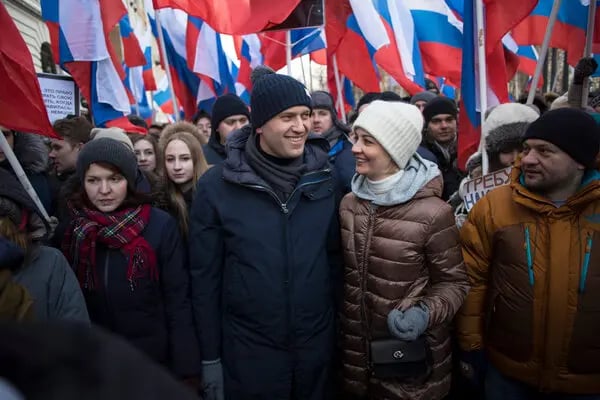
Mr. Navalny and Ms. Navalnaya at a rally in Moscow in 2018 in memory of Boris Nemtsov, a Russian opposition leader who was killed.
On Monday, however, she presented a different face in trying to rally her husband’s followers, suggesting that there was no alternative and saying that the movement should derive strength from his memory.
“I know it feels impossible to do any more, but we have to — to come together in one strong fist and strike with it at this maddened regime, at Putin, at his friends and his bandits in uniform, at these thieves and killers who have crippled our country,” she said.
The dangers and hurdles Ms. Navalnaya faces in trying to assume her husband’s mantle and unite the opposition to Mr. Putin from outside Russia are significant.
The Russian government in 2021 disbanded Mr. Navalny’s Anti-Corruption Foundation inside the country by declaring it an extremist organization, sending the group’s main investigators fleeing into exile, where they continue to work and try to reach Russian audiences.
Cooperating with the organization from inside Russia has been made tantamount to abetting terrorism, limiting its ability to recruit the type of young grass-roots members who had electrified past efforts. Supporters of the Kremlin have tried to use the group’s exile to cast it as irrelevant or a puppet of Western security services.
Ms. Navalnaya cannot return to Russia without the threat of arrest. In June 2023, amid rumors that she might attend one of her husband’s many trials, the state-owned network RT quoted an unidentified law enforcement source as saying that Ms. Navalnaya could be arrested on charges of supporting an extremist organization if she were to return.
And much of Mr. Navalny’s appeal to his followers was personal, thanks to his unyielding humor, muckraking zeal and infectious certainty about the capacity for individual Russians to change the country in the face of cynicism and repression.
Ms. Navalnaya, seething with anger, suggested on Monday that she had no choice but to try. The immediate cause of Mr. Navalny’s death remains a mystery, but his family and team have accused Mr. Putin of killing him through a brutal incarceration.
“In killing Aleksei, Putin killed half of me, half of my heart and half of my soul,” Ms. Navalnaya said on Monday. “But I have another half left and it is telling me I have no right to give up.”
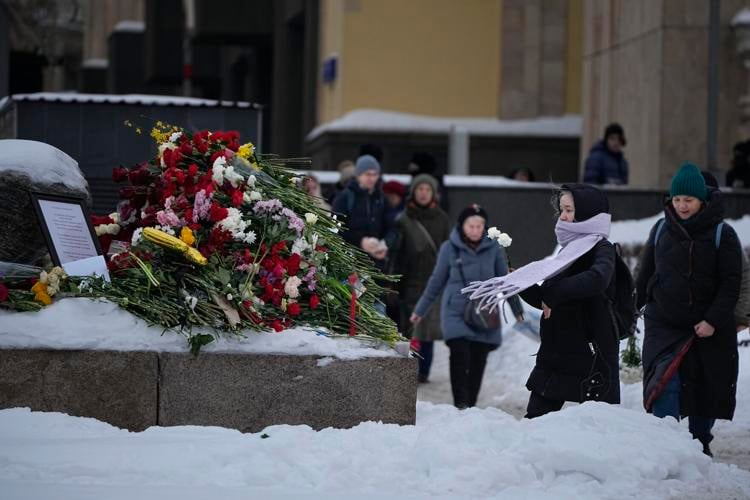
Placing flowers at a makeshift memorial for Mr. Navalny at a monument in St. Petersburg, Russia, on Sunday
She echoed remarks from President Biden last week blaming Mr. Putin for her husband’s death and suggested Mr. Navalny’s team was investigating the circumstances of the death.
“We will name names and show faces,” she said.
She also directly addressed a question that many of Mr. Navalny’s followers have been asking after his death: Why did he return to Russia after his poisoning in 2020, knowing that he would almost certainly be killed?
In theory, she said, Mr. Navalny could have taken up a new life in exile and stopped speaking out against Russian corruption and fighting.
“But he couldn’t,” she said. “Aleksei more than anything else on earth loved Russia, loved our country and you all. He believed in us, in our power, in our future and that we deserved better. He didn’t believe it just in words but in deeds — so deeply and sincerely that he was ready to give his life for it.”
Ms. Navalnaya said that she wanted their two children to live in a free Russia — the “only way for his unthinkable sacrifice not to be in vain.”
Her rousing message was largely welcomed by Mr. Navalny’s supporters, many of whom have been driven out of the country and feel immobilized by grief.
It came as the Russian authorities continued to refuse to hand over Mr. Navalny’s body to his mother in a remote Arctic town close to the prison where he died.
Mr. Navalny’s spokeswoman, Kira Yarmysh, said on Monday that the authorities had told his mother that the body would be subjected to a “chemical examination” for another 14 days.
“One of the lawyers was literally pushed out” from the morgue in the Arctic where Mr. Navalny’s body is believed to be, Ms. Yarmysh said in a post on the social media platform X. She added in another post, “They lie, buy time for themselves and do not even hide it.”
Russian investigators initiated an inquiry into the causes of Mr. Navalny’s death shortly after it was reported, a procedural move that allows them to hold the body for longer than normal.
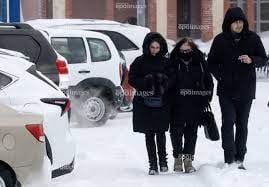
Lyudmila Navalnaya, center, Mr. Navalny’s mother, in Salekhard, Russia, on Monday
Ivan Zhdanov, the head of Mr. Navalny’s Anti-Corruption Foundation, said that the delay meant that Russian officials were “cleaning up traces of their crime.”
“They are waiting for the wave of hatred and rage toward them to calm down,” Mr. Zhdanov said in a poston Telegram, the messaging app.
The Kremlin spokesman, Dmitri S. Peskov, rejected any suggestion of impropriety on Monday, saying that the investigation into Mr. Navalny’s death has been continuing “in accordance with the Russian law.”
More than 63,000 people have signed a petition to Russian investigators demanding the release of Mr. Navalny’s body, a campaign initiated by a Russia-based human rights group, OVD-Info.
Mourners have brought flowers to makeshift memorials across Russia, paying tribute to Mr. Navalny with an act of grief that has also served as a form of protest in a country where even the mildest dissent can risk detention.
The Russian authorities have tried to tamp down the scale of public mourning. Flowers have been quickly removed from memorials and the police have detained hundreds of people.
Russian news outlets have also sought to play down Mr. Navalny’s death, limiting mention of it on television broadcasts. Russian officials have accused the West of jumping to conclusions in blaming Mr. Putin, describing the allegations as yet another example of Western unfairness toward Russia.
(New York Times).
The Russian Embassy in Lisbon, Portugal tonight.
— Visegrád 24 (@visegrad24) February 18, 2024
The text is of Navalny’s famous message from beyond the grave:
“Don’t give up!” pic.twitter.com/HPQQIZrQ4S
____________________________________________
Suddenly Senator Lindsey Graham is sure not playing the Trump Tune on Russia.
Lindsey Graham: Time to designate Russia a state sponsor of terrorism.
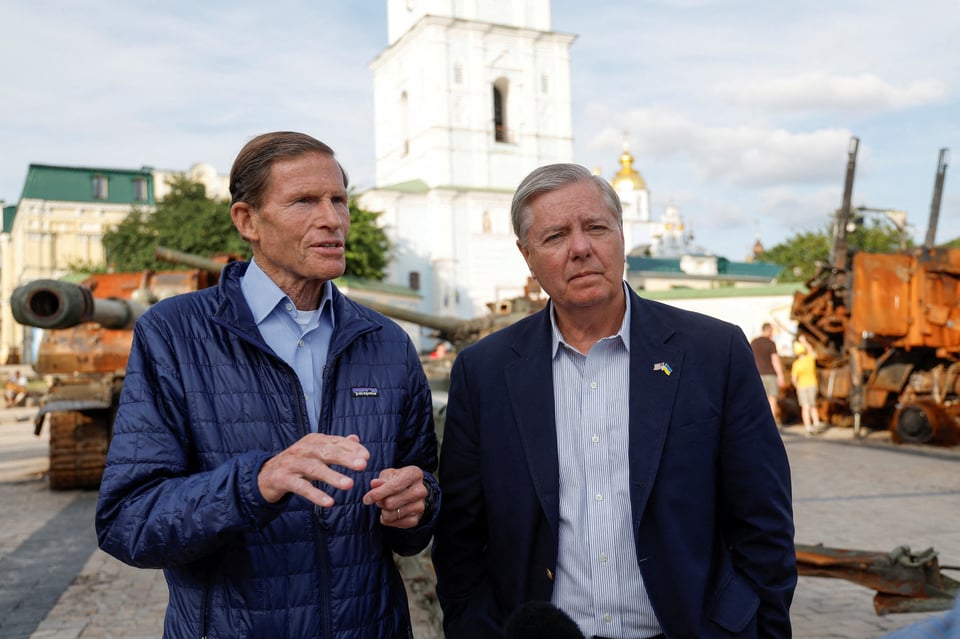
U.S. Senators Richard Blumenthal (D-CT) and Lindsey Graham (R-SC) are co-sponsoring a bill declaring Russia a state sponsor of terrorism.
Sen. Lindsey Graham (R-S.C.) wants to designate Russia a state sponsor of terrorism after the death of Russian opposition leader Alexei Navalny.
Navalny, the most prominent of Russian President Vladimir Putin’s opponents, died in a high-security prison near the Arctic Circle in Russia on Friday, the federal prison service announced. While the prison service said he died after losing consciousness following a walk, there was immediate, widespread speculation — including from President Joe Biden and Ukrainian President Volodymyr Zelenskyy — that Putin was behind Navalny’s death. A spokesperson for Navalny confirmed Saturday that he had died.
“Navalny was one of the bravest people I ever met. When he went back to Russia he had to know he was going to be killed by Putin, and he was murdered by Putin,” Graham said Sunday during an interview on CBS’ “Face the Nation.”
Why don’t we do this: I just got off the phone with two Democratic senators. Let’s make Russia a state sponsor of terrorism under U.S. law. Let’s make them pay a price for killing Navalny.”
There are four countries currently labeled as state sponsors of terrorism by the United States: Cuba, North Korea, Iran and Syria. The designation comes with a battery of sanctions, including restrictions on foreign assistance and a ban on defense exports and sales.
Graham said Sunday that legislation adding Russia to the list could come as early as this week.
“President Biden told Putin, if something happens to Navalny, you’re going to pay a price. President Biden, I agree with you, the price they should pay is to make Russia a state sponsor of terrorism,” Graham said.
Navalny, 47, was repeatedly targeted in recent years, and was subject to imprisonment and poisoning. A nerve agent was found “in and on” his body in 2020, sparking international backlash and leading the Biden administration to place new sanctions on Russia.
Navalny’s death comes a month before a presidential election in Russia, where Putin is set to extend his more than two-decade domination of the country. (Politico).
President Biden said Monday he is weighing additional sanctions against Russia over the death of Russian opposition leader Alexey Navalny. https://t.co/AkpBMIUOOC
— CBS News (@CBSNews) February 19, 2024
Trump, on the other hand, thinks only about himself. First, he was mute since Friday when the world learned Navalny was murdered by Putin. Yesterday Trump finally said Navalny’s name, but not for long.
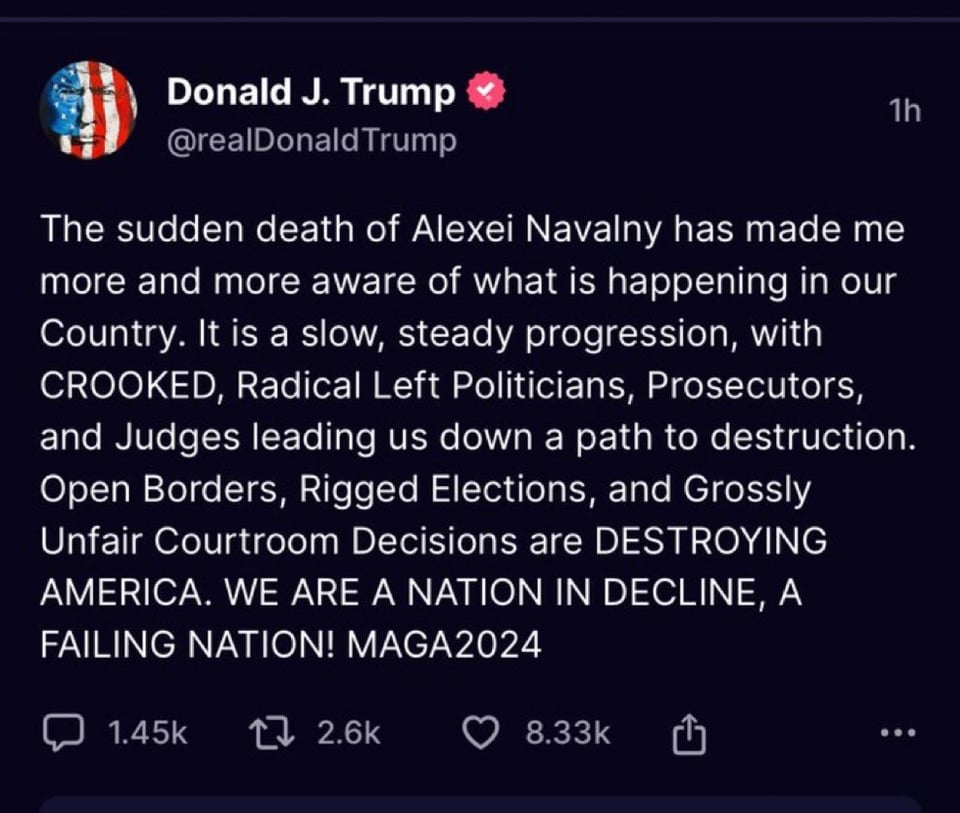
Narcissistic. Bowing to Putin.
____________________________________________
Wisconsin has a fighting chance to be blue.
Get ready to work.
Wis. Democratic governor signs legislative maps into law after Republicans pass them.
Wisconsin’s Democratic governor, Tony Evers, has signed new legislative district maps into law that he proposed and that the Republicans who control the Legislature passed to avoid having the liberal-leaning state Supreme Court draw the lines.
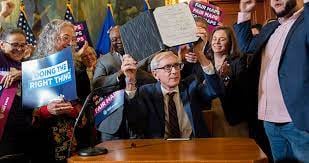
MADISON, Wis. -- Wisconsin Democratic Gov. Tony Evers signed new legislative district maps into law on Monday that he proposed and that the Republicans who control the Legislature passed to avoid having the liberal-controlled state Supreme Court draw the lines.
Democrats hailed the signing as a major political victory in the swing state where the Legislature has been firmly under Republican control for more than a decade, even as Democrats have won 14 of the past 17 statewide elections.
“When I promised I wanted fair maps — not maps that are better for one party or another, including my own — I damn well meant it,” Evers said prior to signing the maps into law at the state Capitol. "Wisconsin is not a red state or a blue state — we're a purple state, and I believe our maps should reflect that basic fact.
Democrats are almost certain to gain seats in the state Assembly and state Senate under the new maps, which will be in place for the November election. Republicans have been operating since 2011 under maps they drew that were recognized as among the most gerrymandered in the country.
Democrats tried unsuccessfully for more than a decade to overturn the Republican-drawn maps. But it wasn’t until control of the state Supreme Court flipped in August after the election of liberal Justice Janet Protasiewicz that Democrats found a winning formula.
They filed a lawsuit the day after Protasiewicz joined the court. Republicans argued that Protasiewicz shouldn’t hear the lawsuit because she said during her campaign that the GOP-drawn maps were “rigged” and “unfair.” But she did not recuse herself.
Protasiewicz ended up providing the deciding fourth vote in a December ruling that declared the current maps to be unconstitutional because not all of the districts were contiguous, meaning some areas were geographically disconnected from the rest of the district. The court said it would draw the lines if the Legislature couldn’t pass maps that Evers would sign.
The court accepted maps from the governor, Democratic and Republican lawmakers, as well as three other parties to the redistricting lawsuit. Consultants hired by the court determined that maps submitted by the Legislature and a conservative law firm were “partisan gerrymanders,” leaving the court with four Democratic-drawn maps to choose from.
Facing a mid-March deadline from the state elections commission for new maps to be in place, the Legislature on Tuesday passed the Evers maps. While skeptical Democrats voted against the governor’s plans, many of the party's leaders praised Evers' signing of the new maps Monday.
“Wisconsin will no longer be among the most gerrymandered states in the nation,” Assembly Democratic Leader Greta Neubauer said in a statement. Neubauer, who voted against the maps, added that "this is the beginning of a new era in Wisconsin — where the will of the people will once again be the law of the land.”
the new maps are “a huge win for the people of Wisconsin” — even though she voted against the maps.
Wisconsin Democratic Party Chairman Ben Wikler said the new maps will have a “reverse coattails” effect benefitting Democrats in the statewide presidential and U.S. Senate races this year because more legislative races will be competitive.
Republicans described having no better option. Republican Assembly Speaker Robin Vos said Monday in a statement that Evers “signed the most Republican-leaning maps out of all the Democrat-gerrymandered maps being considered by the Wisconsin Supreme Court.”
“This fall Republicans will prove that we can win on any maps because we have the better policy ideas for the State of Wisconsin,” said Vos.
Other Republicans were even more stark after the passage of the bill last week.
“Republicans were not stuck between a rock and hard place,” Republican state Sen. Van Wanggaard said in a statement. “It was a matter of choosing to be stabbed, shot, poisoned or led to the guillotine. We chose to be stabbed, so we can live to fight another day.”
Democrats also raised concerns that under the bill, the maps wouldn't take effect immediately. That raises a legal question for any special or recall elections that take place before November, given that the state Supreme Court already ruled that the old maps are unconstitutional.
Evers said Monday that “these maps will take effect immediately after publication and will be in place for the fall elections.” He also asked the state Supreme Court to clarify that the maps will be in effect for any special elections prior to the November election.
Under the new maps, there would be 15 incumbents in the Assembly who would be forced to run against another incumbent and six such pairings in the Senate. Only one of the Assembly pairings would pit one Democratic incumbent against another one. In the Senate, the only Democratic pairing includes an incumbent who has already decided not to run this fall.
Litigation continues in more than a dozen states over U.S. House and state legislative districts that were enacted after the 2020 census.
The Wisconsin Supreme Court also has been asked by Democrats to take up a challenge to the state’s congressional district lines. The lawsuit argues the court’s decision to order new state legislative maps opens the door to challenging the congressional map. Republicans hold six of the state’s eight congressional seats.
(ABC News from Associated Press ).
We were very close to losing our democracy. https://t.co/Zhsa98ztll
— Republicans against Trump (@RpsAgainstTrump) February 19, 2024
____________________________________________
Coming right up - Elections this month.
Get ready to vote and get out the vote.
Michigan.
We need every Michigander to make their voices heard in 2024 for @JoeBiden and @KamalaHarris.
— Gretchen Whitmer (@gretchenwhitmer) February 19, 2024
Make a plan to vote now or on February 27th in the presidential primary at https://t.co/K3zlefaA54! pic.twitter.com/tlQMdlDrj9
South Carolina. Republican Primary.
Trump vs. Haley.
Ends on Saturday, February 24.
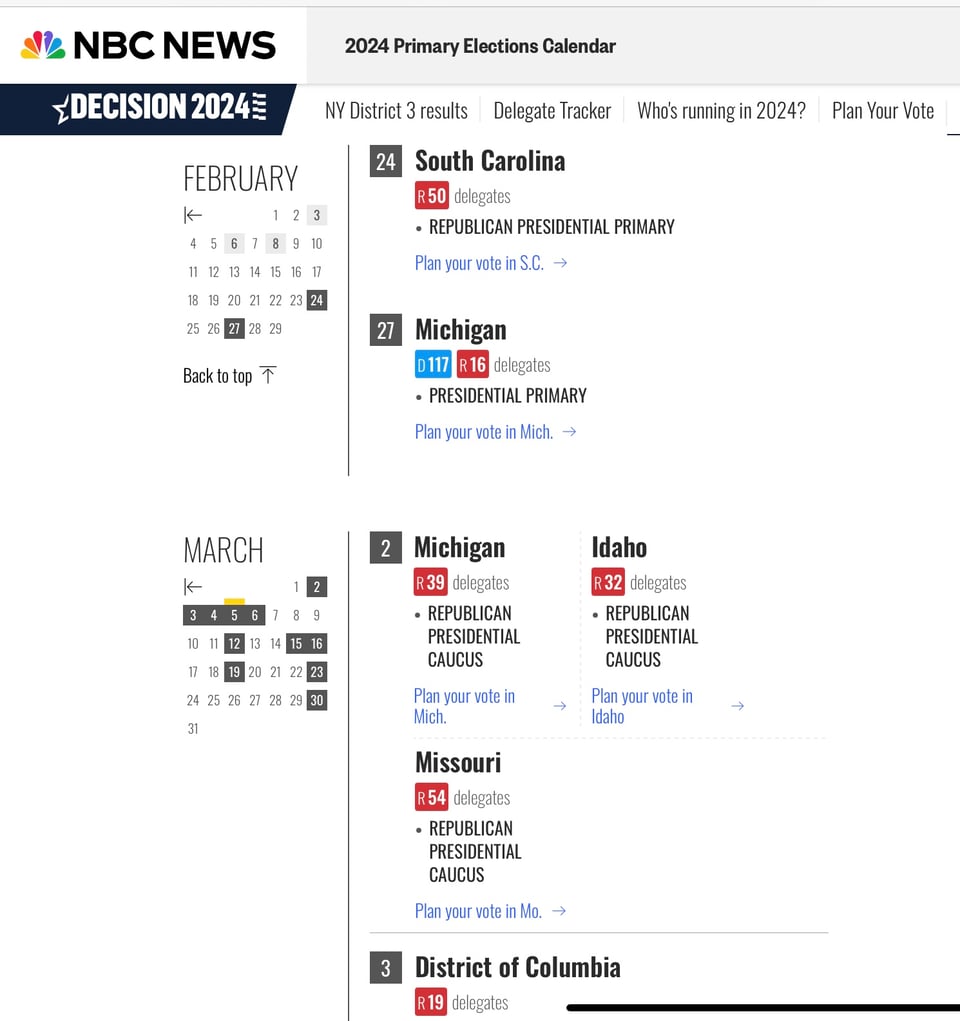
March 5, Super Tuesday, is the day when the greatest number of states hold their primaries or caucuses.
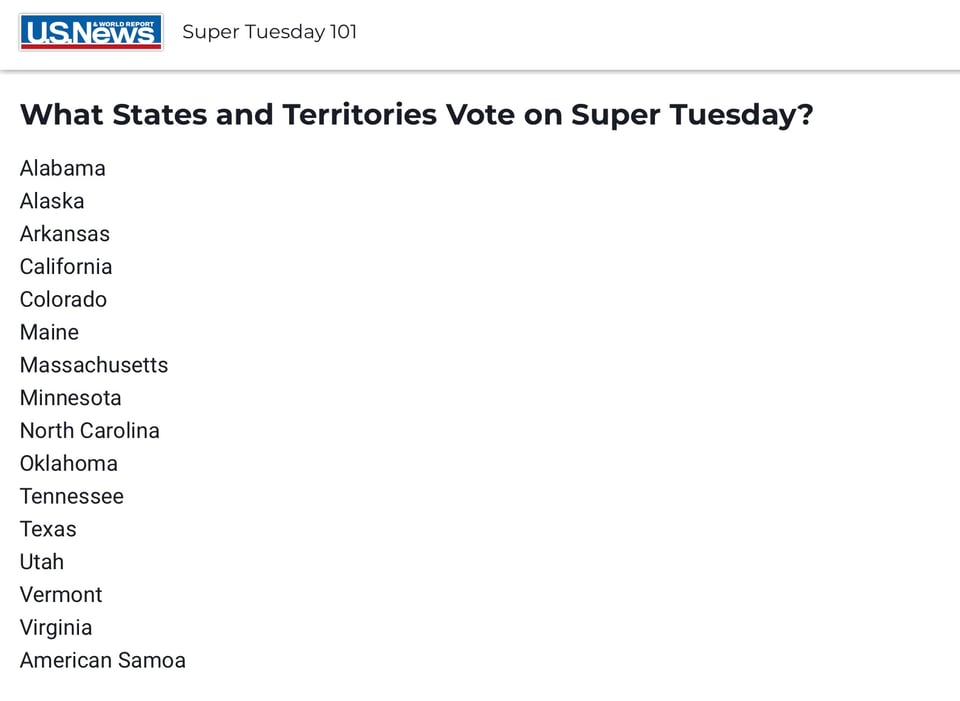
____________________________________________
Yesterday was an American Day of Infamy.
“Those who cannot remember the past are condemned to repeat it,” George Santayana.
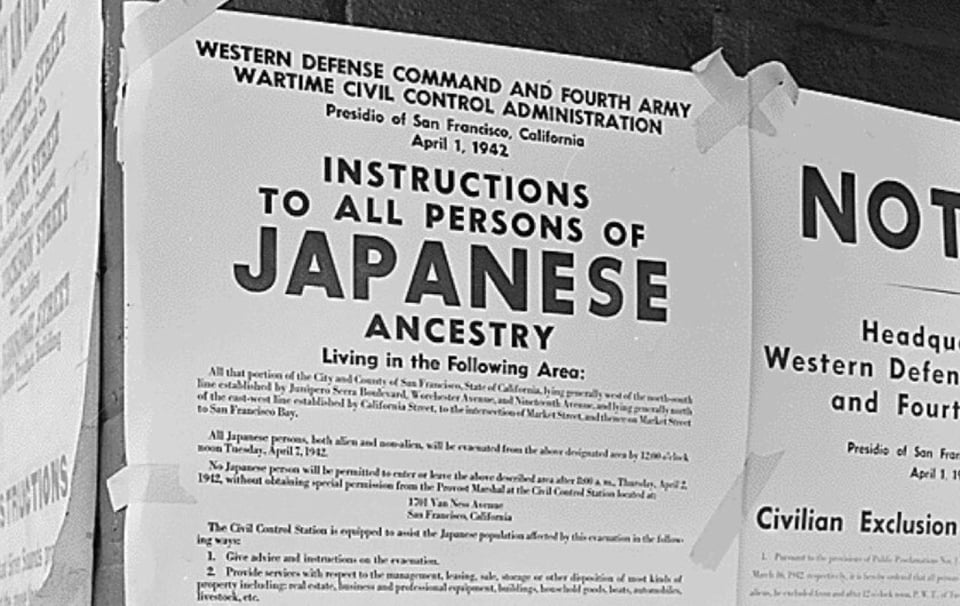
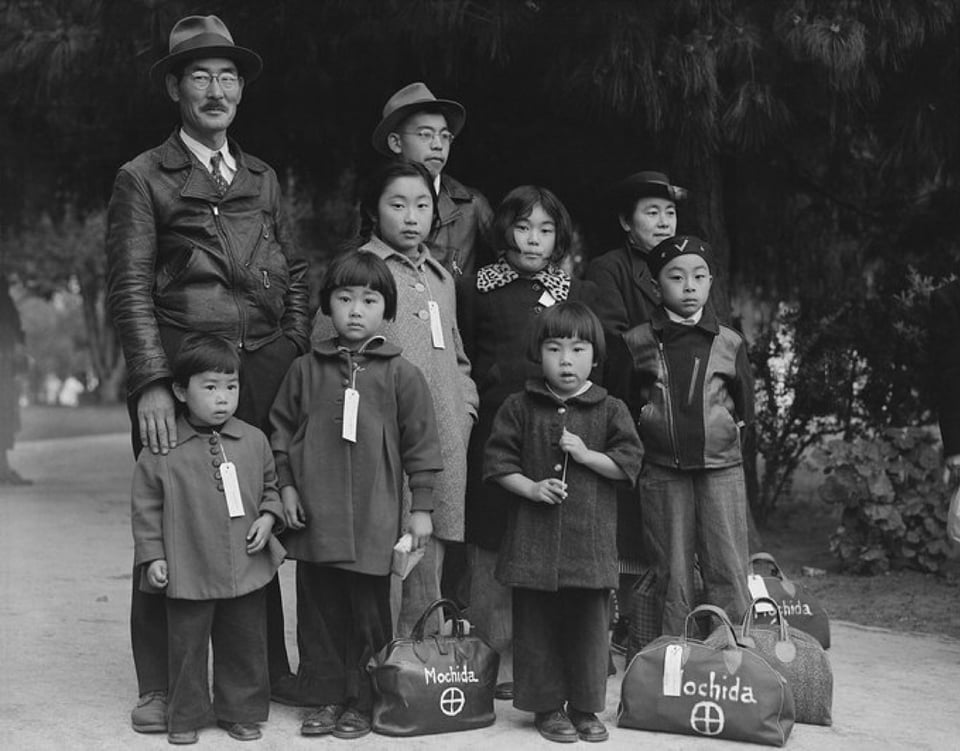
On this date February 19 in 1942, President Franklin D. Roosevelt signed executive order 9066, allowing the U.S. military to relocate Japanese Americans to internment camps. Photo by Dorothea Lange: Mochida family awaiting evacuation to internment camp.
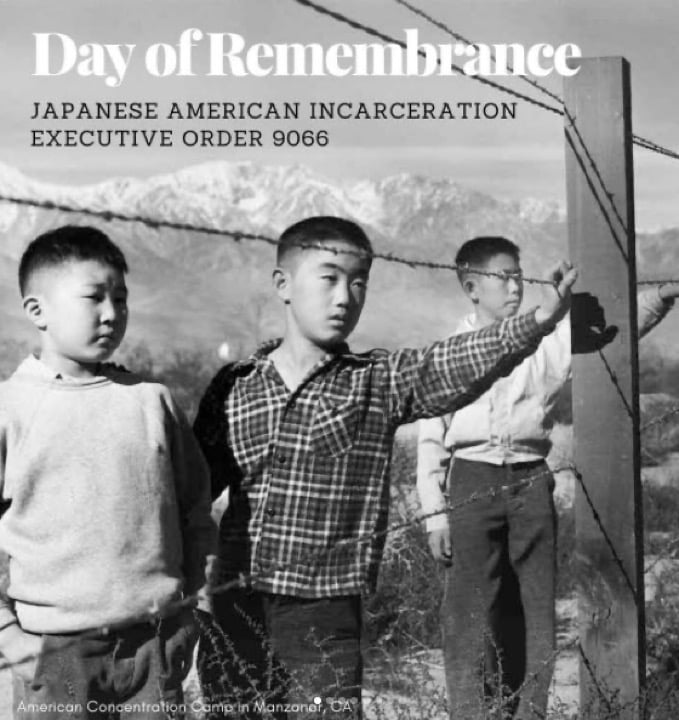
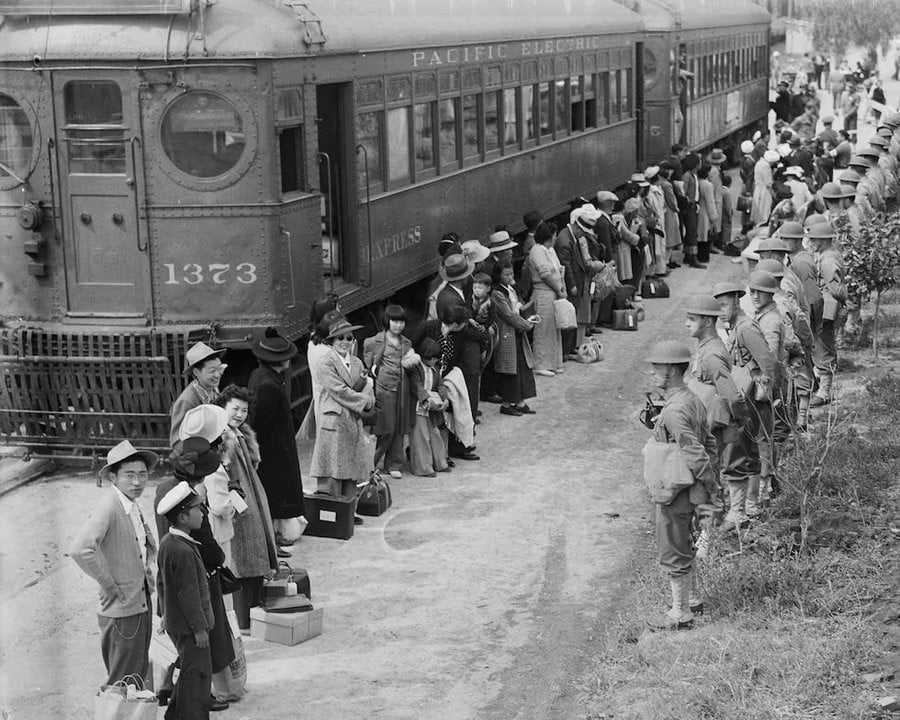
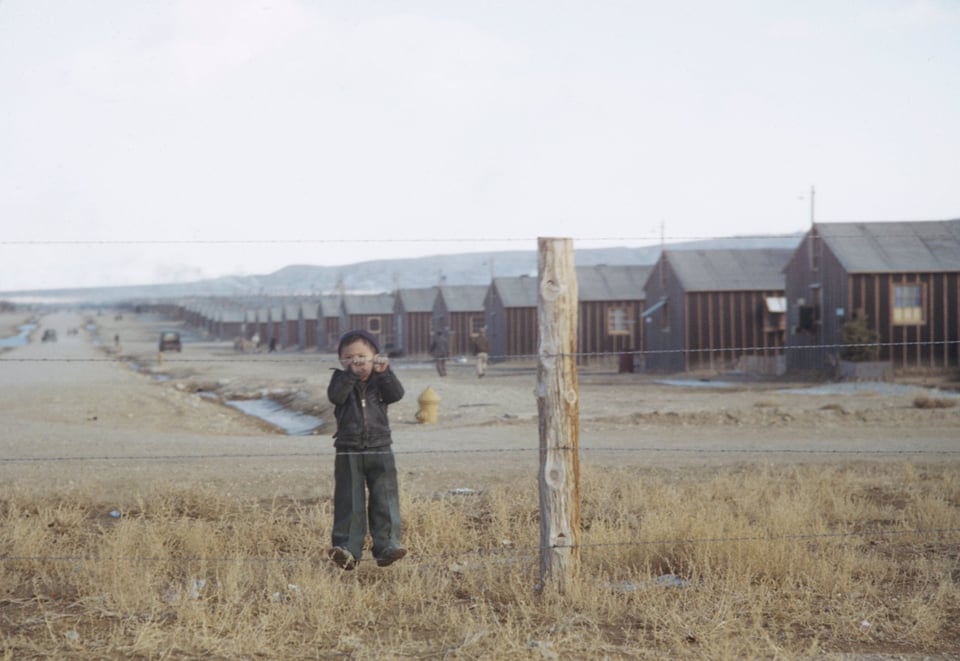
____________________________________________
Evan Wolfson has a dream.
Evan conceived of same-sex couples having the right to marry. He founded the organization to make that happen in America. Now he works to make that happen around the world.
Greece just legalized same-sex marriage. Will other Orthodox countries join them any time soon?
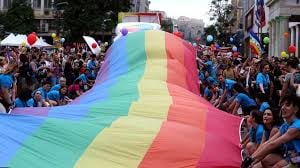
Greece has become the first majority-Orthodox Christian nation to legalize same-sex marriage under civil law. At least for the near future, it will almost certainly be the only one.
Eastern Orthodox leadership, despite lacking a single doctrinal authority like a pope, has been united in opposing recognition of same-sex relationships both within its own rites and in the civil realm. Public opinion in majority Orthodox countries has mostly been opposed, too.
But there are some signs of change. Two small majority-Orthodox countries, Montenegro and Cyprus, have authorized same-sex unions in recent years, as did Greece in 2015 before upgrading to this week’s approval of full marital status.
Civil unions may become more common among Orthodox countries gravitating toward the European Union. They remain off the table in Russia, which has cracked down on LGBTQ+ expression, and countries in its orbit.
Following is a summary of church positions and public opinion in the Orthodox world, followed by the situation in individual majority-Orthodox lands.
THE ORTHODOX WORLD
Eastern Orthodoxy is a socially conservative, ancient church with elaborate rituals and a strict hierarchy. Churches are mostly organized along national lines, with multiple independent churches that share ancient doctrine and practices and that both cooperate and squabble.
Roughly 200 million Eastern Orthodox live primarily in Eastern Europe and neighboring Asian lands, with about half that total in Russia, while smaller numbers live across the world. Like other international church bodies, Orthodoxy has confronted calls for LGBTQ+ inclusion.
A 2016 statement by a council of most Orthodox churches called marriage between a man and a woman “the oldest institution of divine law” and said members were forbidden from entering same-sex unions.
Ecumenical Patriarch Bartholomew of Constantinople, considered the first among equals among Orthodox leaders, affirmed that stance in a statement after the Greek vote. But he added that the church must respond to members in such unions “with pastoral responsibility and in Christ-like love.”
In countries where they are a majority, Orthodox believers overwhelmingly said society should not accept homosexuality or approve same-sex marriage, according to surveys conducted in 2015 and 2016 by the Pew Research Center, a Washington-based think tank.
Greek Orthodox showed relative tolerance, with half of Orthodox saying homosexuality should be accepted and a quarter favoring same-sex marriage. In more recent polls, Greeks overall narrowly supported the marriage law.
The Greek law validates marriage in the civil realm but doesn’t require any church to perform such rites.
Nevertheless, Greece’s Orthodox leadership unanimously opposed the law in January, saying the “duality of genders and their complementarity are not social inventions but originate from God.”
Greek Prime Minister Kyriakos Mitsotakis acknowledged the church’s position but said, “We are discussing the decisions of the Greek state, unrelated to theological beliefs.”
Civil unions may be in some Orthodox countries’ near future, said George Demacopoulos, director of the Orthodox Christian Studies Center at Fordham University in New York.
“In terms of civil marriage, I think the countries that are in the European Union will eventually all do it,” Demacopoulos said. “My guess is the assemblies of bishops in those countries will offer some resistance to the measure, and depending on where you are, that may or may not delay it.”
UKRAINE
In Ukraine, same-sex couples cannot register their status legally.
In 2023, the issue became acute as many LGBTQ+ people joined Ukraine’s armed forces. That year, a bill was introduced in Parliament to establish civil partnerships for same-sex couples, providing basic rights such as compensation if one of the partners is killed in action.
The All-Ukrainian Council of Churches and Religious Organizations — which includes Ukraine’s two rival Orthodox churches — opposed the draft law, contending that some international entities are using the country’s current vulnerability to force unwanted changes.
The legislation remains pending.
The European Court of Human Rights ruled in 2023 that Ukraine violated the rights of a same-sex couple who sought legal protections provided to married heterosexual couples.
Ukraine is majority Orthodox, with various religious minorities.
RUSSIA
In increasingly conservative Russia, President Vladimir Putin has forged a powerful alliance with the Russian Orthodox Church and has made “traditional family values” a cornerstone of his rule, juxtaposing them with “perversions” of the West.
Putin effectively outlawed same-sex marriages in the 2020 constitutional revision that added a clause stipulating that marriage is a union of a man and a woman.
In 2013, the Kremlin adopted what’s known as the “gay propaganda” law, banning any public endorsement of “nontraditional sexual relations” among minors.
After sending troops into Ukraine in 2022, Russian authorities ramped up a campaign against what it called the West’s “degrading” moral influence, in what rights advocates saw as an attempt to legitimize the war.
Patriarch Kirill of Moscow has assailed LGBTQ+ rights. As head of the Russian Orthodox Church, he oversees the world’s largest Orthodox flock. He depicted his country’s invasion of Ukraine as part of a metaphysical struggle against a liberal agenda that included “gay parades.”
In November, Russia’s Supreme Court effectively outlawed LGBTQ+ activism, labeling what the government called the LGBTQ+ “international movement” as an extremist group and banning it in Russia.
In 2021, a survey by Russia’s top independent pollster, the Levada Center, showed that only 33% of Russians completely or somewhat agree that gay men and women should enjoy the same rights as heterosexuals, a decrease from earlier years.
BELARUS
The Belarus Family Code defines marriage as a “union between a man and a woman.” There is also no legislation prohibiting discrimination based on sexual orientation and gender identity.
Homosexuality was decriminalized in Belarus in 1994, but the LGBTQ+ community faces heavy stigma and high suicide rates, advocates say.
Human rights groups report hundreds of cases of the KGB — the country’s main domestic security agency — trying to recruit gay people and threatening to out them.
SERBIA AND MONTENEGRO
Serbia and Montenegro, two conservative Balkan nations where the Serbian Orthodox Church holds huge influence, have had mixed results addressing LGBTQ+ rights as part of efforts to join the European Union.
Tiny Montenegro passed a bill in 2020 allowing same-sex partnerships — not marriage and with fewer rights. In Serbia, a similar draft law never made it to a parliamentary vote.
The Serbian Orthodox Church, which maintains close relations with the Russian church, has opposed the idea of same-sex marriages.
Serbia’s President Aleksandar Vucic has said he would not sign off a bill on same-sex marriages, although Serbia has had an openly lesbian prime minister for years. Activists have been campaigning for legal partnerships.
Pride marches in Serbia are routinely banned or held under tight security. In Montenegro, though same-sex partnerships are allowed, the highly male-oriented society of 620,000 people remains divided over the issue.
ROMANIA AND MOLDOVA
Romania is one of the few European Union members that allows neither same-sex marriage nor civil unions, despite a growing social acceptance of LGBTQ+ people.
In 2023, the European Court of Human Rights ruled that Romania had failed to enforce same-sex couples’ rights by not legally recognizing their relationships.
In early February in Romania, LGBTQ+ activists were allegedly assaulted while holding a peaceful protest outside the Bucharest headquarters of the country’s far-right AUR party.
In 2018, Romania held a referendum — backed by the Orthodox Church — on whether to narrow the constitutional definition of marriage from a ″union of spouses″ to a ″union between one man and one woman.”
Rights campaigners urged Romanians to boycott the vote, which failed due to low turnout.
In neighboring Moldova, which isn’t an EU member but has official candidate status, neither same-sex marriages nor unions are allowed.
Large majorities in both countries are Orthodox.
BULGARIA
Public opinion in Bulgaria is mostly hostile to gay people and more so to same-sex marriages. In the Balkan country, patriarchal family traditions still predominate.
The European Court of Human Rights last year found that Bulgaria’s government was violating European human rights law in failing to legally recognize same-sex couples. The court also ruled that Bulgaria is obliged to adopt legal recognition for same-sex couples, but Bulgaria shows no signs of implementing the decision.
Leaders of the Bulgarian Orthodox Church, which includes about 80% of Bulgarians, condemned the ECHR ruling and called on the government not to give in.
Bulgaria’s constitution explicitly prohibits the recognition of same-sex marriage. Amending the constitution requires a two-thirds majority in parliament on three consecutive votes. Such a scenario seems remote. (Associated Press).